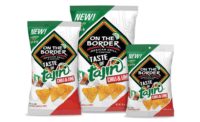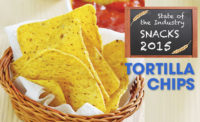Even though we are now nearing the end of the COVID-19 pandemic, consumers have become comfortable with snacking more at home, including snacking on tortilla chips. This trend will continue through 2021, but consumers are also searching for better-for-you and plant-based tortilla chip options.
Gluten-free tortilla chips are also in-demand—although most tortilla chips are usually made from ground corn, which is naturally gluten-free, sometimes brands’ chips can contain a mix of both corn and wheat flour, meaning they’re not gluten-free.
Market data
According to data from IRI, Chicago for the past 52 weeks ending May 16, 2021, the tortilla/tostada chips category rose a healthy 5.1 percent, with $6.285 billion in sales.
Unsurprisingly, Frito-Lay led the pack, with $4.389 billion in sales and a 3.1 percent increase from last year. Barcel USA followed with $599 million in sales, and a notable 27.1 percent increase, and private label chips came in third, with $314 million in profits but a 6.4 percent dip from the previous year.
Others to watch include the Doritos brand, made by Frito-Lay, which by itself brought in $2.689 billion. Tostitos chips brought in $793 million, too, and Tostitos Scoops brought in $541 million. Barcel Takis Fuego, the popular often-spicy tortilla chip, brought in $504 million in sales and was up by 18.3 percent compared to last year’s numbers. Its parent brand, Barcel Takis, rose 319.1 percent in sales, too.
Late July, always one to watch, rose by 39.3 percent in sales, bringing in $46.2 million, and Siete’s tortilla chips sales rose by 69.9 percent as compared to its 2020 sales. Sabritas Tostitos/Tortilla Chips also has a good year, rising by 13.7 percent in sales.
Looking back
“According to Innova data, some of the top trends in tortilla chips from 2016-2020 for new product launches were: gluten-free, non-GMO, organic and vegan. Of these trends, gluten-free was the largest,” says Ricardo Rodriguez, marketing manager, confectionery & bakery. Ingredion Incorporated, Westchester, IL. He notes 58 percent of new product launches within this time frame were positioned as gluten-free.
“Crispy and crunchy texture continue to be the two largest texture call-outs. The top three flavors during 2016-2020 were: Nacho cheese, lime, and chili. Protein and plant-based are also areas within this category where developers can continue to differentiate, as more than half (54 percent) of the new product launches contained 7 grams of protein,” Rodriguez notes.
Following this flavor trend, in January 2020 Late July launched a No Grain tortilla chips line, in both Sea Salt and Sea Salt & Lime flavors. The recipe included organic ground TIGERNUT flour, known for its slightly nutty taste, blended with cassava flour and chia seeds.
In keeping with plant-based trends, in February 2020 REAL FOOD FROM THE GROUND UP launched a lineup of butternut squash-based snacks, including Butternut Squash Tortilla Chips, available in Sea Salt flavor.
“Extending Butternut Squash to Tortilla Chips was a natural addition to our plant-based snack offerings,” said Aaron Greenwald, president of REAL FOOD FROM THE GROUND UP. “Our consumers and trade partners asked for more veggies and we are giving it to them—eating right doesn’t need to be full of tradeoffs.”
Spicy snack also were popular this past year, with Late July launching a Restaurant Style Jalapeño & Lime tortilla chip flavor in September/October 2020. All of the brand’s Restaurant Style chips are USDA certified-organic, Non-GMO Project Verified, gluten-free, vegan, and kosher pareve, and made with no artificial flavors, colors or preservatives.
Also in October 2020, Frito-Lay announced its new Tostitos Hint of Guacamole Bite Size Rounds product, lightly seasoned with guacamole flavor and spice. The brand positioned the product as being perfect for football season.
However, even with all these trends in the tortilla chip category there is still room for further innovation and improvement, Rodriguez adds. “Ingredion conducted a recent proprietary study with consumers of gluten-free plant-based snacks from a better for you and nutritional perspective. The consumers in the study wanted to see improvement in the areas of reducing sugar, carbohydrates, and calorie content.”
Looking forward
Rodriguez says that the rise of plant/vegetable-based ingredients continues to be an area of growth and differentiation in the snacking space. “There is a health halo around the use of plant-based ingredients and consumers are continually looking for better-for-you alternatives. The use of plant-based ingredients helps these consumers feel like the tortilla chips are giving them that option,” he says.
Ingredion recently conducted a proprietary study in which 36 percent of consumers said they have tried tortilla chips with vegetable-based ingredients or ancient grains and that 73 percent of those consumers liked the texture of those chips more or the same as traditional tortilla chips, Rodriguez revealed. “Ingredion recently launched a broad line of solutions under the PRECISA Crisp texturizer brand that can help enable the creation of differentiated textures in tortilla chips, whether [consumers] want a crispier or a crunchier chip or [if] a completely new texture is desired. The new texturizers enable the creation of traditional and baked snacks with enhanced textures, optimal expansion and reduced breakage,” he says.
In processing, the texturizers help create dough that is more cohesive and easier to sheet, while managing hydration and stickiness, says Rodriguez. “The texturizers are available from different sources to meet consumer preferences, such as corn tapioca and potato.”
Ingredion also has a complete plant-based portfolio of ingredients to help tortilla chip manufacturers meet consumer demand, Rodriguez adds. “Ingredion offers various pulse-based ingredients to deliver on formulator needs, from flours and protein concentrates to protein isolates. Quinoa flour was recently added to Ingredion’s portfolio of plant-based solutions. Quinoa is an edible seed that is higher in protein than most cereals, is easily digestible, contains all nine essential amino acids making it a more protein complete food than most vegetables, is gluten-free, and is not a major allergen. The quinoa flour from Ingredion is sustainably grown and North American-sourced and manufactured.”
As for flavor trends in 2021 and beyond, spicy is here to stay, specifically Habanero flavor: Tostitos (Frito-Lay) already announced a new Habanero flavor this year, as did Tia Lupita. Tia Lupita’s product is Cactus Grain-free Tortilla Chips, made with Nopales cactus, which is high in fiber and low in carbohydrates, with superfood antioxidant properties resembling goji berry, moringa, kelp, and kale.
Lime flavors aren’t going anywhere either, as Tostitos has already released a limited edition Sweet Lime and Sea Salt variety. The chips were released in May 2021 as part of a partnership with actor Danny Trejo, in celebration of Cinco de Mayo.
Producers will also continue to experiment with different bases, such as Late July’s new vegetable tortilla chips, released in February 2021, available in two flavors: Beat the Heat! Red Pepper, and Dangle the Carrot. The tortilla chips are plant-based and Non-GMO Project Verified; Beat the Heat! chips are made with chia seeds and seasoned with chipotle, to add some spice, and the Dangle the Carrot chips are made with teff seeds and seasoned with cumin and paprika.
Consumers’ interest in tortilla chips is unlikely to wane this year, and if companies keep producing new and interesting flavors, they should be able to keep that interest piqued for years to come.










